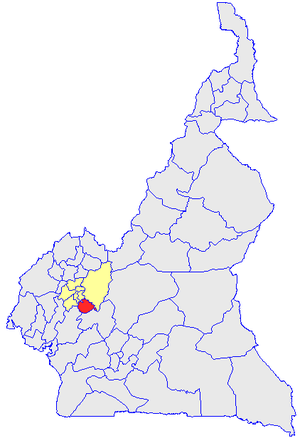Ndé
NDE is one of the 58 divisions found in Cameroon. It is located in the western region of the Country, about 150km from Douala the economic capital and about 265 km from Yaoundé the political capital. Its estimated population is 200,000. There are two meanings that are attached to the acronym NDE. The first and most popular is Nobility, Dignity, Elegance. The second meaning is New, Deal, Economy. Bangangte has been the headquarter of the NDE division since June 14, 1961. Medumba is the most common language spoken in this region. Its kingdoms include; Bangangte, Bangoulap, Balengou, Bazou, Bakong, Bamena, Tonga (Badounga), Bahouoc, Bangang-Fokam, Bawock, Bangoua, Batchingou, Bamaha and Bagnoun. The main Religious belief is Christianity, with the two main denominations being Catholics and Protestant. Its climate ranges between 14- 22 Celsius at night and between 24-30 Celsius. Some anthropological research has been done by Pradelles de Latour. [1][2]
Ndé | |
|---|---|
 Department location in Cameroon | |
| Country | |
| Province | West Region |
| Capital | Bangangté |
| Area | |
| • Total | 588 sq mi (1,524 km2) |
| Population (2001) | |
| • Total | 123,661 |
| Time zone | UTC+1 (WAT) |
Subdivisions
The department is divided administratively into 4 communes and in turn into villages.
References
- Pradelles de Latour Dejean, C.-H. 1975. Parenté et famille dans une chefferie Bamiléké du Ndé au Cameroun. Nanterre: Unpublished thèse du 3me cycle, Université de Paris X.
- Pradelles de Latour Dejean, C.-H. 1976. La structure Parentale dans une Chefferie Bamiléké du Ndé (Cameroun). Journal de la Societé des Africanistes 46, 95-103.